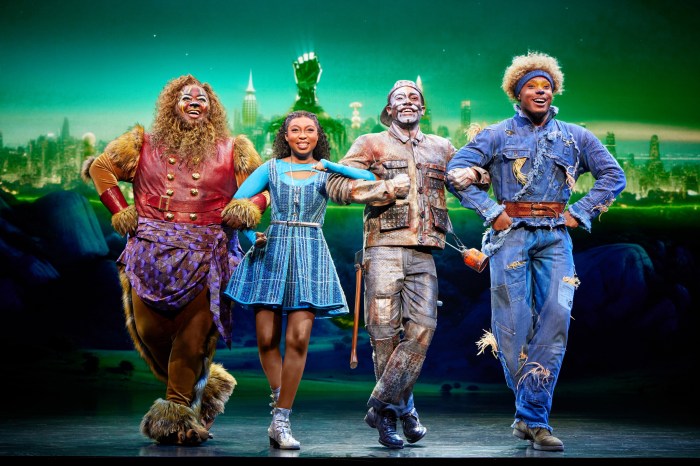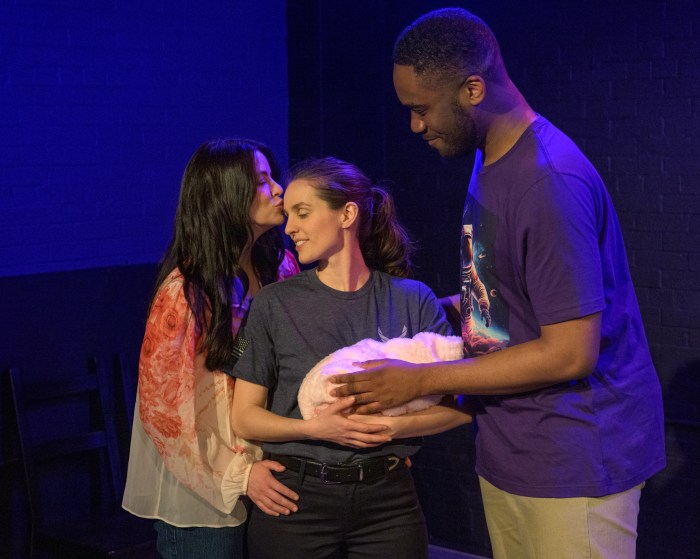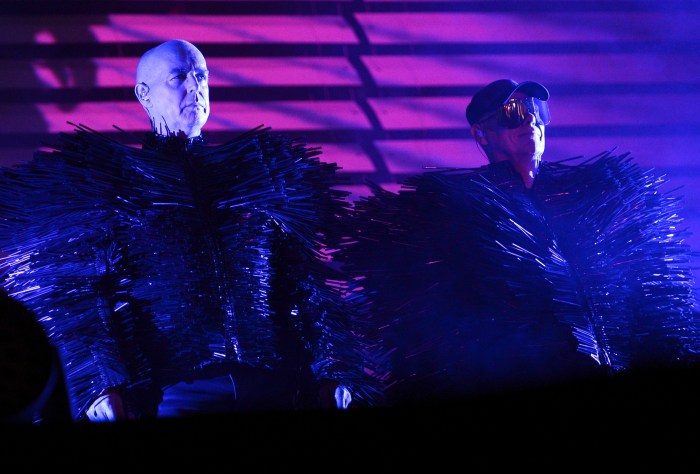Part of the allure of the New York International Fringe Festival is its vast range of edgy talent, and part of the fun is uncovering the hits and avoiding the misses. No small task, with more than 200 shows to choose from.
The first three FringeNYC shows that I saw were recommended by insiders as strong contenders, but they proved as uneven as the festival itself. Each had flashes of brilliance, but also flaws, so none qualifies in my book as a downright must-see. But are they worth a look? Absolutely.
Britney on the skids, Blanche DuBois after Katrina, a feminist tied up
BECOMING BRITNEY
When you think of a Fringe show about Britney Spears, you might expect a fitful bashing of the beleaguered, bloated pop star. And yet “Becoming Britney,” the high-octane musical created by Molly Bell, who also stars in the title role, and Daya Curley, who directs, is both a parody and, strangely enough, a heartfelt homage of sorts.
The 90-minute romp, overstuffed with sometimes clever, sometimes silly original songs and dance moves that seem lifted from lost Britney videos, takes us through the star's foibles we've all seen ad nauseum in the tabloids, but with a sardonic spin. Or, as one musical number puts it, “From girl next door to millionaire whore.”
The play opens with a goofy group-share sequence from the “Promises, Promises PR Fixery and Spirit Spa,” where we're treated to flashbacks portraying what led a bald Britney there. We see glimpses of her pushy Mama Rose-like stage mother, her virginal love affair with Justin Timberlake, her not-so-virginal love affair with Kevin Federline, her boozy girls-gone-wild days with Paris and Lindsay, and, of course, the infamous head-shearing incident.
While much of the accompaniment is provided by pianist Katie Coleman, some numbers are prerecorded and (intentionally) overproduced, with performers lip-synching, to stay true to Britney's style. The score and choreography gleefully mix various genres, shifting effortlessly from pop to hip-hop to ballet to waltz to gospel. They even added a dollop of opera as well.
My favorite number was the kookily creepy “Push It Out,” set in the maternity ward where a writhing Britney pops out her babies.
A flashy video screen, surprisingly high-tech and glitch-free for a Fringe production, enlivens the staging.
Without a formidable lead, this show would fall flat. But lucky for us, Bell, who sings and moves like Britney, strikes a perfect caricature that spurs us to laugh both with her and at her.
Also noteworthy are Riette Burdick as the rehab moderator and Britney's Mama, and Carrie Madsen as a hooker. The supporting cast is rounded out by Keith Pinto, Alison Ewing, and Sean Grady, who succeed in their multiple roles to varying degrees.
My chief complaint, besides choosing such an easy target, is that “Becoming Britney” packs so much plot, the execution suffers. Some judicious cutting and restaging would make for a cleaner, more potent production.
BLANCHE SURVIVES KATRINA IN A FEMA TRAILER NAMED DESIRE
When Hurricane Katrina hit a couple of years back, Louisiana-based writer-performer Mark Sam Rosenthal watched in horror as the atrocities of the storm's aftermath played out on national television. And he couldn't help but think, “But what would Blanche DuBois do?”
The result is this sardonic, politically incorrect, gender-twisting solo show titled “Blanche Survives Katrina in a FEMA Trailer Named Desire,” which imagines a broken Blanche as the ultimate refugee, separated from Stanley and Stella. Yet she refuses to let a blow-hard diva like Katrina upstage her.
Seeing this faded Southern belle – who finds solace in a bourbon bottle, the company of gentlemen callers, and a vivid imagination – transported to modern times, is amusing. But I must confess, it took me a while to warm up to this piece.
Directed by Todd Parmley, the play opens painfully slowly with a manly Rosenthal, dressed in dingy gym shorts and muscle shirt, on a mission to salvage fragments of a house ruined by the hurricane. Amongst the rusty detritus he finds a valise with wigs and accessories that help transform him into the famous Tennessee Williams anti-heroine.
Although the publicity stills depict Rosenthal in full makeup and feminine attire, he fails to bother with this physical transformation onstage, and it detracts from the illusion. At first he simply seems like some hairy-chested guy in a bad wig.
What's more, I found the sequences set in the New Orleans Super Dome, where Blanche mocks the atrocities of the impoverished “colored” people, inept and unfunny.
But around the time the nerve-addled Blanche boards a bus for Shreveport to stay in a seedy motel, Rosenthal finds his rhythm, and I got hooked. His impersonation grows stronger, and the wry dialogue, a crafty play on Williams' poetic language, begins to work its manic magic.
The scenes in the motel hit their comic marks, as when Blanche offers her roommate an Ativan she found “rattling around the Super Dome” and then pops another. When a burly gentleman offers her a strange pipe, Blanche's reaction after taking a hit is genius. “Sometimes there's God, so quickly,” she squeals. That pipe, it turns out, contains crack cocaine.
Other scenes set in a mega-church in Phoenix, and in an AA meeting, where she spikes her coffee with whiskey, are also worth a few chuckles.
Interwoven are reflections of the terrible night when the waters rose; the mystery of what really happened to Stanley and Stella and the baby is revealed. When Blanche declares, “even the kindness of strangers fails me now,” we share her despair.
THE ALICE COMPLEX
When Peter Barr Nickowitz was writing “The Alice Complex,” an ambitious psychological thriller about a renowned feminist professor made a prisoner in her own home by a maniacal female student, he wasn't content with crafting a simple linear narrative.
Instead, he goosed up the plot with flashbacks to the professor's childhood and to the lesbian bookstore where the student first discovers feminist literature, plus a fast-forward to when she is a 50-year old psychotherapist. He also interjects scenes involving actresses playing the professor and student, suggesting the main action is actually a play within a play. There's even a bit where two women are debating the work's merits, as they clutch their “Alice Complex” Playbills.
Sound confusing? Yes it is, made even more so because actors Lisa Banes and Xanthe Elbrick take on multiple roles. Complex indeed.
What carries us through the overly fractured structure are the splendid performances. Both actors have solid Broadway experience, a rarity for the Fringe.
As the aging feminist who renounces the seminal work she wrote years earlier (also titled “The Alice Complex”), Banes, who bears more than a passing resemblance to Meryl Streep, is a joy to behold. When she declares, “God, I hate women!,” she conveys the choking bitterness over losing her youthful exuberance and the “dwindling of possibility.”
As the psychopathic student who alleges to have been raped, Elbrick is thoroughly convincing. Her contempt for her mentor, after years of idolization, is chilling. We actually believe that the box she holds might contain, as she claims, the severed penis of her perpetrator.
Under the direction of Bill Oliver, what could have been a conventional nail-biter is conceived and played as a self-referential comedy, which undercuts the power. Mention of the book “The Phallus at the Margin” got a lot of laughs. After being tied up with phone cords, lying on the floor, the professor quips directly to the audience, “Would it kill the dramatic tension if I told you I'm not going to die?”
I couldn't help but think, with all of those jump cuts and extraneous characters and tonal shifts, much of the dramatic tension died a while ago.
While some Fringe shows make the mistake of taking one good concept and stretching it thin, “The Alice Complex,” has the opposite problem, cramming enough ideas into 75 minutes to sustain several plays. But this kind of screw-the-rules risk-taking is what the Fringe is all about, and I applaud it.
FRINGENYC | Various Downtown Venues | Aug. 8-24 | $15 at 212-279-4488 or visit fringenyc.org for complete schedule

































